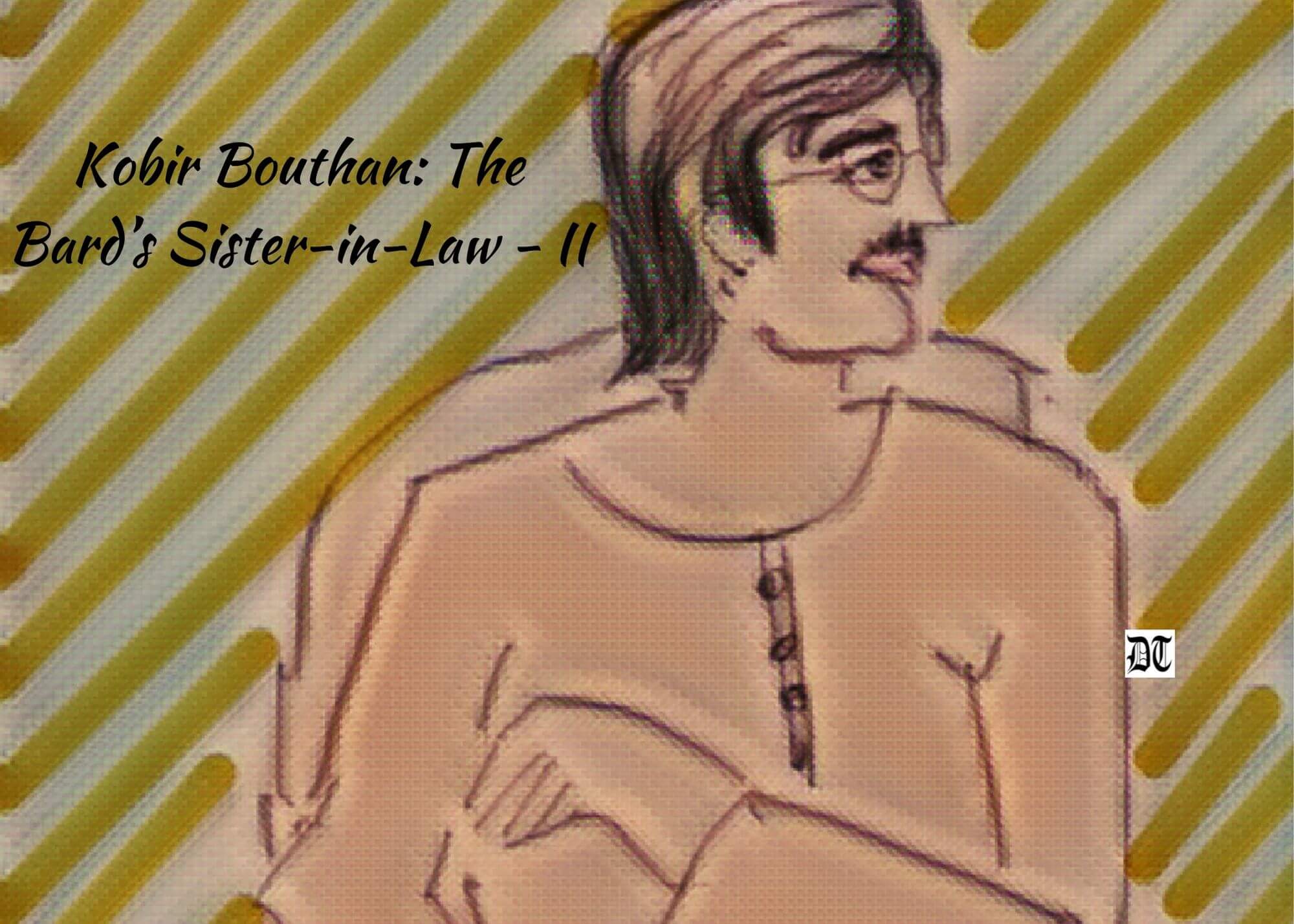Here’s the second and concluding part of Lopamudra’s translation of Mallika Sengupta’s, a renowned Bengali poet and novelist’s biographical novel, Kobir Bouthan (Bard’s Sister-in-law). Here’s the first part of the two-part excerpt — an exclusive for Different Truths.

The people of Thakur bari were originally Vaishnavas, worshipping the idols of Lakshmi-Janardan as their family deity. For generations, the sons and their wives had observed all the pujas and rituals with austerity. For a long, Sarada had learnt all the customs and the puja rituals from her grandmother-in-law Alaka Shundari and her mother-in-law Digambari. But her heart and soul were in tatters when her husband Debendranath had initiated himself into the Brahmo religion, rejecting all forms of idol worship. Stuck between her husband’s newly embraced religion and her years of allegiance to Hinduism and its numerous customs, she continued being bruised and battered in her heart. As for Satyen, he understood the psyche of his mother when she spoke thus, but he had already taken an oath to himself to free his mother of all her shackles of obsolete rituals.
“Ma, why don’t you understand, unless you change yourself, the civilisation becomes stagnant, either in religion or society. Alas, a country which keeps its women imprisoned within the four walls forever seeps into darkness. And listen, if it is the question of enhancing the dress sense of our women, didn’t Baba moshai himself experiment with the attire of my sisters? Didn’t he keep changing their attires from Peshowaj to Indian gowns? Remember, even you have made your daughters wear those dresses designed by our Muslim tailors!”
“It was because I had been forced! Otherwise, how would our daughters sit to study in front of the Pandit Moshai, their tutor, with just a sari draped over their bare bodies? Hence that arrangement to cover their bodies!” Sarada replied.
“It’s the same, Ma, with your Mejo Bou! How would she get out of home and mix with others in our society without covering her body with proper attire? The way women in our household drape saris over their bare bodies is unfit for exposure to the civilised world. She must mix with so many people from the sophisticated, aristocratic society, courtesy of my job, Ma!” Satyen said with full enthusiasm.
“I don’t understand why a respected family woman must mix so much with outsiders!” Sarada replied …
“I don’t understand why a respected family woman must mix so much with outsiders!” Sarada replied with an austere face. “Look at us; we never stepped out of our home…If we got permission to have a bath in the Ganges, we had to remain inside the palanquins, closed from all sides. Don’t you remember going with me for the bath as a child? You’ve seen with your own eyes how our bearers would plunge the entire palanquin with us in the Ganges a few times, and that was the only way we could take the holy bath! And now, you made the bride of our house journey in a car, walk to the inner quarters in front of the servants, uncovered, unabashed? Alas, why am I even alive to witness such blasphemy?”
“Goodness, Ma! What is the need to maintain the Islamic purdah system in our house? How long will our girls and brides remain in our princely prison?”
Sarada seemed highly annoyed. “Go away, don’t bug me now! Go to your room, freshen up and have something to eat. I thought you would exchange some good words with your mother after your long journey, but instead, you are keen on arguing with her.”
“Manada…Go and check if food is served in their room.” She called for the maid servant.
“Yes, the food is being sent, Karta Ma.” Manada, the maid, answered. As Satyen stepped inside his room, Sarada asked again, looking at the semblance of his long, handsome physique: “Did you arrange for the food the way I told you to?”
“Yes, Ma, we have sent sweets made of coconut, Ananda Naru (dessert), luchi (puffed bread), eggplant fritters in silver trays, wrapped in laced covers. Also, there is watermelon drink with ice in silver glasses for them.”
Sarada took a betel leaf from a Capricorn-faced tray made of silver…
Sarada took a betel leaf from a Capricorn-faced tray made of silver, put it in her mouth, and with an anxious face, reclined on the pillow again. Manada, the maid, started massaging her feet, as usual.
When Satyen reached his room, he noticed the lavish arrangements of the morning meal, the silver tray stuffed with food, and beverages, all adorning the wooden stool beside the palanka (bed). He noticed the women surrounding Gyanada in the verandah, seated on a sprawling mat. Let them chit-chat to their heart’s content for a while, he thought, while having his food. Memories of his excruciating struggles to let his wife out of this same corridor, verandah, this very home flashed in front of his eyes. His eyes had opened up the first time he had been to London for his ICS examination. He was in complete awe of the open, liberated western society and its free, enlightened women. The free spirit of those outgoing, emancipated women made him think of western society as an ideal one. Their uninhibited mixing with the men in society didn’t seem to disrupt the domestic rhythm one bit; instead, those elegant, educated women appeared to complement the men as their most deserving partners. Why on earth wouldn’t our Bengali women be like them? He wondered. Those days, he often thought about how he could bring Gyanada to London with him. Of course, when she would be there, observing the free spirit, the unhindered lives of these women, she would be inspired to change herself too.
And while he was fascinated by the appeal of those Englishwomen, he didn’t forget his beautiful thirteen-year-old bride for a single moment.
And while he was fascinated by the appeal of those Englishwomen, he didn’t forget his beautiful thirteen-year-old bride for a single moment. As a matter of fact, his grandfather Dwarakanath was fascinated by English ladies, too, while he was in London. He had enjoyed his days immensely with his sweet tete-a-tate with Queen Victoria, his exploits with the memsahibs inside luxurious boat rides in the heart of Thames. He had liberated himself by seeking those light pleasures. After some years, when he was led astray by his Anglicised companions, his wife Digambari had almost renounced his company, fearing that she would lose her religion. Despite his unlimited wealth, his social status, and his accomplishments, he couldn’t mould his wife to accept his ways of living. Prince Dwarakanath indeed had a princely disposition. His lavish parties with meat and drinks, and his ball dance with mem sahibs in his Belgachhia villa had invited enough scandal during those days. Rupchand Pakshi moshai, a poet of those times, had composed a sarcastic rhyme on his exploits.
“Only the Thakur company knows what there is in that red drink,
What do we know of its attributes, but only the people of the Thakur ilk?”
Digambari Devi, his grandmother, fascinated Satyen more than his free-spirited grandfather. She had the ethereal looks of Goddess Jagaddhatri, but her spitfire personality was something Satyen knew as her essence. One of those nights, when her husband Dwarakanath would indulge in partying and merrymaking in his villa, she went out of the house in her closed palanquin with her troop to witness the scene with her own eyes.
During those days, it was quite a daring act for a conservative woman who remained confined within the inner quarters.
During those days, it was quite a daring act for a conservative woman who remained confined within the inner quarters. When they were young, she shared a beautiful, hearty relationship with her husband. When Dwarakanath worshipped the family deities of Lakshmi-Janardan, his beautiful teenage bride Digambari would be his accomplice, the beauty of her fair face and pure devotion being amplified by the incense and Indian frankincense. Her charm had enamoured Dwarakanath, the devotee of sheer beauty during those early days. Being orthodox Brahmins, their kitchen was devoid of meat, fish, onion, and garlic. But then, as Dwarakanath’s business ventures became incredibly successful, his mixing with the sahibs and memsahibs grew exponentially. While the advent of neo-liberalisation and his involvement with it, with his irresistible attraction towards the babu culture* which had spread its wings then, his dependence on his orthodox Hinduism gradually dwindled. Also, the Brahmin Pandits back then had declared that he was rendered unworthy of worshipping the Hindu deities. He had been impure, they said, mixing indiscriminately with the Englishmen. Then, what his wife Digambari did to him was history.
Just before going to London, one day, Satyen called his teenage wife Gyanada and narrated the story of his grandmother to her.
“You can’t even imagine what a daring woman my grandmother was, Gyenu,” he said, to provoke a fire within her.
“For quite a while, she had been listening to the stories of Dadamoshai’s (grandfather) adventures in his Belgachhia villa…”
“For quite a while, she had been listening to the stories of Dadamoshai’s (grandfather) adventures in his Belgachhia villa, that he was drinking alcohol with the English men and ladies, that he was having meat dishes cooked by a Muslim chef. Than-didi, my grandmother discarded those stories initially, but after repeatedly listening to them, she decided to go and check for herself what really happened inside the villa. Just think, what a daring act for a young woman during those days!”
“Oh my, my heart palpitates, just hearing about this act of hers! Did Than-didi go there alone, all by herself?” The young Gyanada asked, trembling.
“Not alone…she took my mother and a couple of women from the inner quarters along with her. Three palanquins of the Thakur bari, with yellow borders and red satin covering, stopped in front of the Belgachhia villa. My mother, a timid young girl back then, was petrified, she told me later. Her hands and feet had frozen in fear.”
“What happened then? What did they see?” Gyanada asked, curious.
“When she came out of the closed palanquin, she witnessed something which she had never experienced. The entire villa, at night, was transformed into a beautiful phenomenon of light. It was quite a spectacle when my grandmother entered the giant hall with her battalion of women, crossing the majestic garden embellished with the fountain, the nude feminine figurines, the mammoth pillars, and the stunning architecture of the huge mansion. Amid the tinkling sound of the cups and glass vessels, amid the shimmering splendour of the fancy chandeliers and the grandeur of the imported furniture, the dancing men and women stopped and stood transfixed.
… her husband Dwarakanath … had a glass of wine in one hand while in the other and, he was dancing to the tunes of an English song with a memsahib, holding her waist …
“With her own eyes, Than-didi, our grandmother, saw the Muslim chefs serving fish and meat dishes on the tables, the white men dancing with white women, embracing them tightly. Her eyes were transfixed on her husband Dwarakanath, who had a glass of wine in one hand while in the other and, he was dancing to the tunes of an English song with a memsahib, holding her waist with his other hand. For some seconds, she stood statue-like, witnessing this unthinkable scene, and then was overwhelmed by seething anger. Dadamoshai trembled for a moment; perhaps he had gauged the rage and fire inside his wife from under her veil. As he approached to soothe her, she glared at him with contempt-filled eyes, piercing him with her glances, and left the hall haughtily.”
“That means Than-didi was the boldest woman of this house, wasn’t she? I want to be like her,” Gyanada said. “The moment I find you have been led astray; I will distance myself from you. Beware!”
“Will you be as stonehearted as her?” Satyen laughed and asked her.
“Will you be as stonehearted as her?” Satyen laughed and asked her. “Do you know what she did after that? When Dadamoshai lost his right to perform the daily puja rituals, she asked herself, would she lose her religion if she remained close to him in her marital life? After conscious deliberation and discussing in detail with the Brahmins, she decided to tend to all her husband’s needs and then take a bath to sanctify herself. She decided to quit co-sleeping with her husband in his bed at night.”
“What are you saying? What gave her the courage to perform such an act in an orthodox family like yours?” Gyanada asked, surprised.
“You do not have half as much courage as her, Gyenu,” Satyen said affectionately, pulling her head to his inviting chest. “Gradually, she stopped Dadamoshai from entering the inner quarters and made arrangements for his bed in the living room. In due time, a separate kitchen was also made for him, severing their ties permanently.”
The twelve-year-old Gyenu was all the more astonished. “But is it good to severe ties with your husband? Isn’t the husband supposed to be the religion of every woman?” She asked.
“Listen, Gyenu; it is tough to judge what is just in the name of religion and what is not…”
“Listen, Gyenu; it is tough to judge what is just in the name of religion and what is not. Do you know that our Didi-thakurani (Grandmother) would start her puja rituals as early as four in the morning and have only vegetarian food she cooked herself? A brahmin cook used to help her arrange her meals and organise the puja ingredients. During every Ekadashi, she would survive only on fruits and even fast during some Ekadashi seasons. Since her husband couldn’t get along his life with her satwik life, she had deliberately abstained from the pleasures of her husband’s company. Her allegiance to her religion was greater for her than her allegiance to her husband.
“But wasn’t she a married woman? Why did she observe Ekadashi then?” Gyanada was shocked in astonishment.
“I have heard about Grandma’s unconditioned faith in fasting for her husband’s welfare. Why an immensely devoted wife like her turned so cruel and hard-hearted is the subject of much thought.”
Satyen’s eyes had almost closed in sleep due to fatigue while reminiscing these old stories. The tender touch of Gyanada’s fingers woke him up from his slumber. The other girls had left already. Gyanada was decked up in a soft tant sari, blue in colour, and the aroma of the Bakul flowers in her hair tied up in a bun was welcoming the migrant Satyen with all richness of his Bengali homeland. In the privacy of her room, Gyanada didn’t care about wearing the jacket she wore when she stepped outside, but she couldn’t wear the sari over her bare body too; it would be too rustic for her tastes. Hence, she chose to wear a very light satin chemise and wrap the sari around it as gracefully as possible. Her fragrant attire to complete her dress-up made her even more charming. Was it the same young girl Satyen had taken to Mumbai along with him, crossing the Laxman Rekha of the four walls of this palace? He wondered in awe.
“Do you remember, Gyenu, what you did on the first day of our dinner party in Mumbai?” Satyen asked, embracing her passionately.
… I was just a young Bengali bride of fourteen who had recently stepped outside the threshold of the Thakur bari.
“Ah, don’t forget, I was just a young Bengali bride of fourteen who had recently stepped outside the threshold of the Thakur bari. How was I even supposed to know the manners of the Gora Sahibs? It was unthinkable to sit with the firangis, to eat or drink with them! I had decided beforehand that I would set up the table with all food and drinks with great care for them, but I wouldn’t sit for a meal with him, not at the same table. Remember, that Gora Sahib…as soon as he took my hand in his hand and tried dragging me to the dinner table, I thought what an insolent man he was, freed my hand with all my might and ran, ran far away.”
“Ha-ha-ha!” Satyen laughed out loud. “You know how I had to plead and beg to open the bolted doors that day! Well, I do not blame you for your behaviour that day, the inexperienced young girl that you were…But I feel proud of you for witnessing your gradual transformation, the way you have moulded yourself to absorb the manners and etiquettes and become the worthy wife of the first Indian civilian!”
Within the young girl of those yesteryears, Satyen felt the aura of a new woman, ushering like the golden rays of the sun in her body, mind and spirit. With a tremendous surge of his passion, he took her in his warm embrace and started kissing her.
“Ah, what are you doing? Have you become a child? Can’t you see the open doors and windows…anybody can barge in at any moment!” Gyanada uttered shamefully.
“Do you remember what I said to you back then?” Satyen asked his wife.
“Well, you have told me so many things…how do I know what you are referring to right now?” Gyanada replied in mock anger.
“Remember the letter I wrote to you from England where I had mentioned: ‘Until you have turned to a truly mature, educated woman, progressive in your thoughts in all aspects, we won’t consummate our marriage’.”
Gyanada remembered those early days after their marriage, how she had searched for the meaning of her husband’s words …
Gyanada remembered those early days after their marriage, how she had searched for the meaning of her husband’s words, strolling on the long terrace of the Thakur bari during the lone moonlit nights. A strange, unknown fear had grasped her young mind when she gradually realised that her husband was not fully accepting her and was distancing himself from her. Those early days when her husband wrote to her: “Our marriage has been thrust on us by our parents; it has not happened in the presence of our free will.” Has the time of their sacred union come now?
Gyanada blushed like a newlywed bride. “Why do you tell this now?” She asked.
“But the time is ripe, right now, dear!” Satyen uttered, his voice trembling in unbridled emotions. “In our sacred nuptial room, I am the old seeker of love, this palanka, the cherished bed of our long-awaited union. You are no longer a shackled housewife. O free-spirited woman, I beg to be one with you today, wouldn’t you grant my plea?”
In such an unprecedented moment, Gyanada couldn’t decide what to do and fell over her husband’s bosom. “Now, now, no more drama!” She spoke.
… Satyen took her in his arms, lifted her blushing face with his hand and kissed her on the lips.
In an intense surge of passion, Satyen took her in his arms, lifted her blushing face with his hand and kissed her on the lips. In that long-awaited moment of their union, their bodies were crushing each other with fierce passion and longing. Satyen threw away his clothes on the floor, and Gyanada’s sari too was laid out on the dirty ground. His impatient fingers played with her body, finding a home in her tender breasts, covered with her chemise. Even a piece of thread between the two bodies seemed like a barrier to them.
“Bou (bride), you know, this chemise won’t be a much desirable thing for married women. You’ll need to think about this issue a bit.” Satyen uttered boldly at this point.
Amused at her husband’s mischievous thoughts, Gyanada made a fist at him in mock anger.
“What are you doing, Bou? Would you start beating your husband as the first step towards your freedom? You know, the orthodox Hindus might have kept their women within the four walls of their homes, fearing this!” Satyen said, smiling.
“See what I do to you now!” Gyanada said. As she came closer to her husband, supporting her body with her knees, she placed her tender lips on top of his masculine lips, closing his lips with her own.
At this moment, her husband realised that the free woman had sought freedom in her love. After their prolonged kiss, this proclamation of freedom had been made when she released her lips.
Translator’s Note
The vernacular Bengali literature of my own ethnic lineage that I largely grew up on was a fertile ground for unforgettable stories, and my exploration of metaphorical truths of myriad human experiences through reading such rich literature has expanded my horizons phenomenally. As a sensitive reader exposed to this rich literary world, I was not only intrigued by these classic masterpieces, but day after day, I kept feeling that as a translator, I could act as a cultural bridge, connecting the diverse trajectories of the poetic and fictional worlds of the vernacular authors par excellence and the global readers. They want to taste those intriguing poems, stories, narratives.
Bengal’s award-winning poet and novelist Mallika Sengupta had published Kobir Bouthan during the turn of the new millennium (2000), which is a biographical novel based on the lives of the various protagonists belonging to the illustrious Jorasanko Thakur bari, Kolkata, the birthplace of the Nobel laureate of Bengal, Rabindranath Tagore. The women and men within the Thakur bari and their lives have inspired the journeys of many people in Bengal, and the women have especially played pioneering roles in shaping the contours of society, beyond their lifetimes, and these phenomenal journeys form the premise of this book.
The book focuses on the multifaceted history of the illustrious Jorasanko Thakur bari, Kolkata, the birthplace of Nobel laureate Tagore and how the interpersonal relationships between men and women inside that mansion become historically significant in terms of gender and culture studies of the pre-independence era in India and in terms of the development of Tagore’s poetic persona. Through this important translation work, which is a deeply layered narrative, I have tried to unfold the subtle nuances of the socio-political history of Bengal in those times, while retaining the original flavour of the characters and the daily rigmarole of their lives.
Embarking on this journey of the English translation of this avant-garde feminist text has been my honour and delight, inspired by a note sent to me by Subodh Sarkar sir during the pandemic times, giving me permission to translate the novel for global readers. My translation of this classic work will, I believe, enhance the emotional and creative landscape of this beautiful original book, as I hope to convey the fluidity between languages, continents, and cultures.
Author’s Bio:
Mallika Sengupta (1960–2011) was a radical Bengali poet, feminist, novelist, and academic from Kolkata, India, famously remembered for her “unapologetically political poetry”. She has authored more than 20 books in Bengali, including 14 volumes of poetry and three novels (including ‘Kobir Bouthan’), a widely translated poet invited to several international literary festivals. She has also been the poetry editor of Sananda, the largest circulated Bengali fortnightly (edited by Aparna Sen). Along with her husband, the noted poet Subodh Sarkar, she was the founder-editor of Bhashanagar, a culture magazine in Bengali. In addition to teaching, editing and writing, she was actively involved with the cause of gender justice and other social issues.
(Concluded)
Picture design by Anumita Roy, Different Truths





 By
By
 By
By
